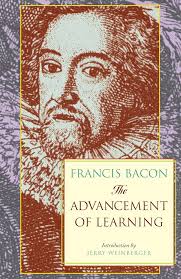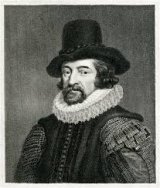The Advancement of Learning Page #35
The Advancement of Learning, published by Francis Bacon in 1605, is a foundational text in the history of science and philosophy. In this work, Bacon advocates for empirical research and the systematic organization of knowledge, laying the groundwork for the scientific method. The book critiques existing scholarly practices and proposes a new approach to learning based on observation and experimentation. It marks a significant shift towards modern scientific inquiry.
- Year:
- 1605
- 1,169 Views
Submitted by acronimous on August 11, 2024
Modified by acronimous on August 11, 2024
it altereth the body proper of the imaginant; for although it hath a manifest power to hurt, it followeth not it hath the same degree of power to help. No more than a man can conclude, that because there be pestilent airs, able suddenly to kill a man in health, therefore there should be sovereign airs, able suddenly to cure a man in sickness. But the inquisition of this part is of great use, though it needeth, as Socrates said, “a Delian diver,” being difficult and profound. But unto all this knowledge de communi vinculo, of the concordances between the mind and the body, that part of inquiry is most necessary which considereth of the seats and domiciles which the several faculties of the mind do take and occupate in the organs of the body; which knowledge hath been attempted, and is controverted, and deserveth to be much better inquired. For the opinion of Plato, who placed the understanding in the brain, animosity (which he did unfitly call anger, having a greater mixture with pride) in the heart, and concupiscence or sensuality in the liver, deserveth not to be despised, but much less to be allowed. So, then, we have constituted (as in our own wish and advice) the inquiry touching human nature entire, as a just portion of knowledge to be handled apart. X. (1) The knowledge that concerneth man’s body is divided as the good of man’s body is divided, unto which it referreth. The good of man’s body is of four kinds—health, beauty, strength, and pleasure: so the knowledges are medicine, or art of cure; art of decoration, which is called cosmetic; art of activity, which is called athletic; and art voluptuary, which Tacitus truly calleth eruditus luxus. This subject of man’s body is, of all other things in nature, most susceptible of remedy; but then that remedy is most susceptible of error; for the same subtlety of the subject doth cause large possibility and easy failing, and therefore the inquiry ought to be the more exact. (2) To speak, therefore, of medicine, and to resume that we have said, ascending a little higher: the ancient opinion that man was microcosmus—an abstract or model of the world—hath been fantastically strained by Paracelsus and the alchemists, as if there were to be found in man’s body certain correspondences and parallels, which should have respect to all varieties of things, as stars, planets, minerals, which are extant in the great world. But thus much is evidently true, that of all substances which nature hath produced, man’s body is the most extremely compounded. For we see herbs and plants are nourished by earth and water; beasts for the most part by herbs and fruits; man by the flesh of beasts, birds, fishes, herbs, grains, fruits, water, and the manifold alterations, dressings, and preparations of these several bodies before they come to be his food and aliment. Add hereunto that beasts have a more simple order of life, and less change of affections to work upon their bodies, whereas man in his mansion, sleep, exercise, passions, hath infinite variations: and it cannot be denied but that the body of man of all other things is of the most compounded mass. The soul, on the other side, is the simplest of substances, as is well expressed: “Purumque reliquit Æthereum sensum atque auraï simplicis ignem.” So that it is no marvel though the soul so placed enjoy no rest, if that principle be true, that Motus rerum est rapidus extra locum, placidus in loco. But to the purpose. This variable composition of man’s body hath made it as an instrument easy to distemper; and, therefore, the poets did well to conjoin music and medicine in Apollo, because the office of medicine is but to tune this curious harp of man’s body and to reduce it to harmony. So, then, the subject being so variable hath made the art by consequent more conjectural; and the art being conjectural hath made so much the more place to be left for imposture. For almost all other arts and sciences are judged by acts or masterpieces, as I may term them, and not by the successes and events. The lawyer is judged by the virtue of his pleading, and not by the issue of the cause; this master in this ship is judged by the directing his course aright, and not by the fortune of the voyage; but the physician, and perhaps this politique, hath no particular acts demonstrative of his ability, but is judged most by the event, which is ever but as it is taken: for who can tell, if a patient die or recover, or if a state be preserved or ruined, whether it be art or accident? And therefore many times the impostor is prized, and the man of virtue taxed. Nay, we see [the] weakness and credulity of men is such, as they will often refer a mountebank or witch before a learned physician. And therefore the poets were clear-sighted in discerning this extreme folly when they made Æsculapius and Circe, brother and sister, both children of the sun, as in the verses— “Ipse repertorem medicinæ talis et artis Fulmine Phœbigenam Stygias detrusit ad undas.” And again— “Dives inaccessos ubi Solis filia lucos,” &c. For in all times, in the opinion of the multitude, witches and old women and impostors, have had a competition with physicians. And what followeth? Even this, that physicians say to themselves, as Solomon expresseth it upon a higher occasion, “If it befall to me as befalleth to the fools, why should I labour to be more wise?” And therefore I cannot much blame physicians that they use commonly to intend some other art or practice, which they fancy more than their profession; for you shall have of them antiquaries, poets, humanists, statesmen, merchants, divines, and in every of these better seen than in their profession; and no doubt upon this ground that they find that mediocrity and excellency in their art maketh no difference in profit or reputation towards their fortune: for the weakness of patients, and sweetness of life, and nature of hope, maketh men depend upon physicians with all their defects. But, nevertheless, these things which we have spoken of are courses begotten between a little occasion and a great deal of sloth and default; for if we will excite and awake our observation, we shall see in familiar instances what a predominant faculty the subtlety of spirit hath over the variety of matter or form. Nothing more variable than faces and countenances, yet men can bear in memory the infinite distinctions of them; nay, a painter, with a few shells of colours, and the benefit of his eye, and habit of his imagination, can imitate them all that ever have been, are, or may be, if they were brought before him. Nothing more variable than voices, yet men can likewise discern them personally: nay, you shall have a buffon or pantomimus will express as many as he pleaseth. Nothing more variable than the differing sounds of words; yet
Translation
Translate and read this book in other languages:
Select another language:
- - Select -
- 简体中文 (Chinese - Simplified)
- 繁體中文 (Chinese - Traditional)
- Español (Spanish)
- Esperanto (Esperanto)
- 日本語 (Japanese)
- Português (Portuguese)
- Deutsch (German)
- العربية (Arabic)
- Français (French)
- Русский (Russian)
- ಕನ್ನಡ (Kannada)
- 한국어 (Korean)
- עברית (Hebrew)
- Gaeilge (Irish)
- Українська (Ukrainian)
- اردو (Urdu)
- Magyar (Hungarian)
- मानक हिन्दी (Hindi)
- Indonesia (Indonesian)
- Italiano (Italian)
- தமிழ் (Tamil)
- Türkçe (Turkish)
- తెలుగు (Telugu)
- ภาษาไทย (Thai)
- Tiếng Việt (Vietnamese)
- Čeština (Czech)
- Polski (Polish)
- Bahasa Indonesia (Indonesian)
- Românește (Romanian)
- Nederlands (Dutch)
- Ελληνικά (Greek)
- Latinum (Latin)
- Svenska (Swedish)
- Dansk (Danish)
- Suomi (Finnish)
- فارسی (Persian)
- ייִדיש (Yiddish)
- հայերեն (Armenian)
- Norsk (Norwegian)
- English (English)
Citation
Use the citation below to add this book to your bibliography:
Style:MLAChicagoAPA
"The Advancement of Learning Books." Literature.com. STANDS4 LLC, 2025. Web. 9 Mar. 2025. <https://www.literature.com/book/the_advancement_of_learning_3165>.








Discuss this The Advancement of Learning book with the community:
Report Comment
We're doing our best to make sure our content is useful, accurate and safe.
If by any chance you spot an inappropriate comment while navigating through our website please use this form to let us know, and we'll take care of it shortly.
Attachment
You need to be logged in to favorite.
Log In